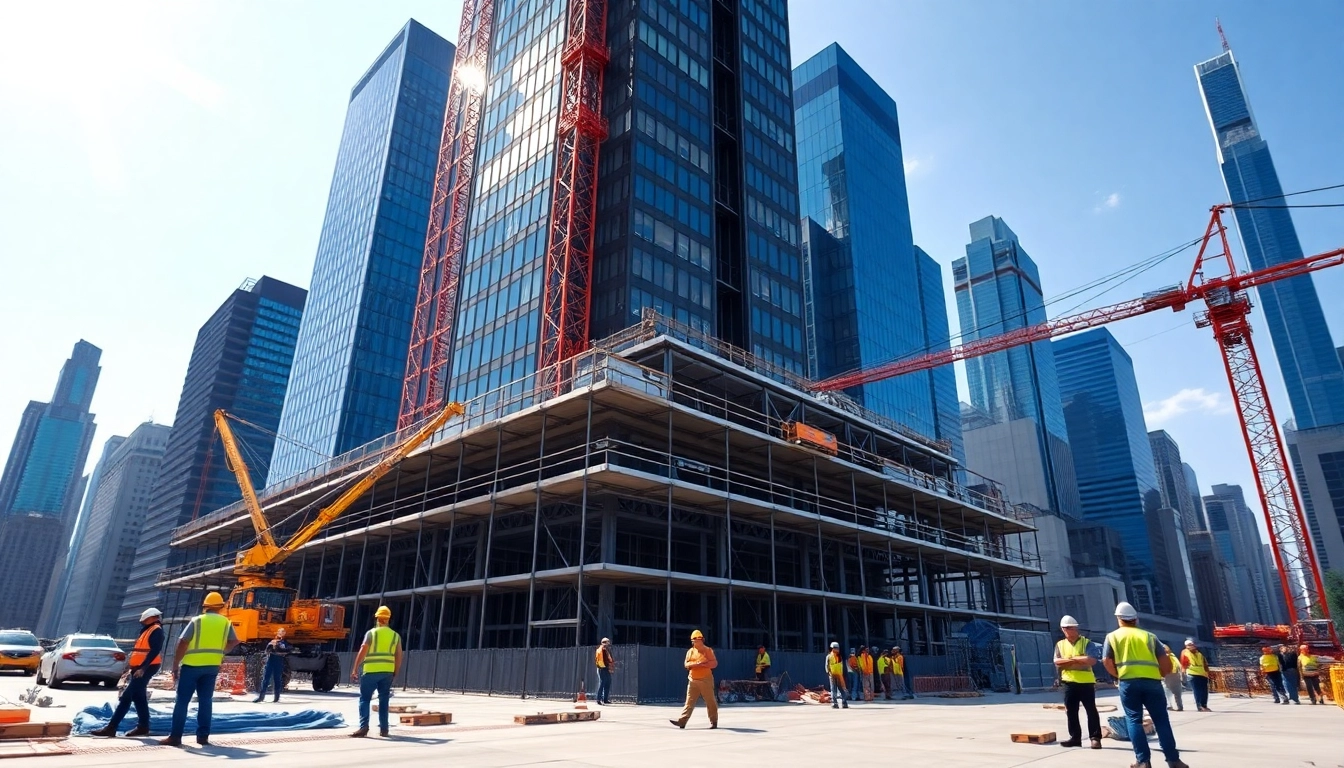Understanding the Role of a New York Commercial General Contractor
Definition and Responsibilities
A New York Commercial General Contractor is a pivotal figure in the construction industry, acting as the primary party responsible for overseeing various aspects of a construction project. Their multifaceted role encompasses a range of responsibilities, from project inception through to completion. This typically includes managing budgets, timelines, and compliance with local regulations, while also coordinating subcontractors and suppliers to ensure that every element of the project aligns with the client’s vision.
In the intricate landscape of New York City’s construction environment, the general contractor is essential for providing not only the labor but also strategic oversight that maintains the project’s momentum. They are tasked with hiring subcontractors for specialized tasks such as electrical work, plumbing, and carpentry, negotiating contracts, and managing those relationships. Furthermore, they must ensure adherence to building codes and safety standards, which are particularly relevant in a densely populated urban area like New York.
Importance in Construction Projects
The significance of hiring a general contractor cannot be overstated. They serve as the lynchpin connecting various stakeholders, including developers, architects, and city officials. The general contractor is crucial for ensuring that a project is not just completed on time and within budget, but also meets the aesthetic and functional requirements set forth by the client. Their role often extends beyond just management; it includes risk management, problem-solving, and resource allocation, all of which contribute to the overall success of the project.
Moreover, general contractors bring a wealth of experience and knowledge regarding local building practices and regulations. In New York, where construction laws can be complex and singular to each borough, having an experienced contractor ensures compliance, thereby reducing the risk of costly penalties or project delays. This expertise leads to enhanced project efficiency and resource management, allowing for smoother operations as construction progresses.
Key Differences Between General Contractor and Subcontractor
While the terms “general contractor” and “subcontractor” are often used interchangeably, they serve distinct roles within construction projects. A general contractor is responsible for the overarching management of the entire project, making high-level decisions and overseeing various tasks. In contrast, subcontractors are typically specialists hired by the general contractor to complete specific aspects of the work, such as HVAC installation or concrete pouring.
This delineation helps streamline project workflows; general contractors maintain the project’s big picture while subcontractors focus on their specialized areas. It’s essential for general contractors to choose reliable subcontractors, as the quality of work they deliver can directly impact the overall success of the project. Clear communication and defined responsibilities between these roles can lead to increased efficiency and productivity on site.
Benefits of Hiring a New York Commercial General Contractor
Expertise and Experience in Local Regulations
One of the foremost benefits of engaging a New York Commercial General Contractor is their in-depth understanding of local regulations. New York City’s construction bylaws are intricate, with regulations varying widely by neighborhood and type of construction. A seasoned general contractor will have navigated these legal waters before and can provide valuable insights that help avoid pitfalls related to zoning laws and permit requirements.
Additionally, their background in local practices means they are aware of potential challenges that can arise during construction, such as local community boards’ restrictions or environmental regulations. This local expertise not only saves time but also ensures that projects run smoothly, without unexpected legal entanglements that could result in delays or increased costs.
Streamlined Project Management
The coordination of various subs and materials can be a daunting task, especially in a city as busy as New York. A general contractor simplifies this process through efficient project management. They establish a clear timeline, assigning tasks, and ensuring resources are allocated appropriately. This not only enhances productivity but also fosters a collaborative atmosphere on the construction site.
Effective project management includes regular updates and meetings with all stakeholders, from subcontractors to clients. This open communication helps to ensure everyone is aligned on project goals and timelines, reducing the likelihood of misunderstandings or conflicts. A well-managed project is more likely to meet deadlines and stay within budget, delivering better outcomes for everyone involved.
Ensuring Quality Control and Safety Standards
Quality control is another crucial aspect of a general contractor’s responsibilities. They implement systems to monitor work quality, ensuring that every component of the project meets or exceeds relevant standards. This is especially important in New York City, where high-rise buildings must meet stringent structural and safety codes. Failing to adhere to these can lead to severe consequences, including legal ramifications.
Furthermore, general contractors are tasked with enforcing safety regulations on-site. They conduct regular safety audits, ensure that all workers are compliant with Occupational Safety and Health Administration (OSHA) standards, and cultivate a culture of safety among all workers. These practices significantly reduce the risk of workplace accidents, thereby protecting the workforce and minimizing liability for all parties involved.
Common Challenges Faced by New York Commercial General Contractors
Dealing with Zoning Laws and Regulations
Construction in New York City is notorious for being fraught with regulatory hurdles, particularly concerning zoning laws. These laws dictate what can be built in certain areas, how high buildings can rise, and the types of materials that can be used. As a general contractor, navigating these regulations is paramount to avoid fines, project delays, and even work stoppages.
To mitigate these challenges, general contractors should engage in thorough research before beginning a project. This typically involves working closely with legal experts and city officials to ensure compliance from the onset. Establishing a good relationship with local agencies can also expedite the permitting process, leading to a smoother project flow.
Managing Project Budgets Effectively
Budget management is another significant challenge that general contractors face. Construction projects can quickly evolve from an initial estimate to unforeseen costs due to material price fluctuations, design changes, or delays caused by weather or labor disputes. Maintaining financial control is critical for the project’s success.
General contractors must implement rigorous budgeting strategies, including detailed forecasting and regular financial reviews. They can use project management software to track spending and forecast future costs based on current expenditures. This proactive approach not only highlights potential overspending early but allows adjustments to be made, ensuring the project remains financially viable.
Coordinating Subcontractors and Suppliers
The orchestration of various subcontractors and suppliers is a complex task that requires finesse and strong organizational skills. Each subcontractor typically has a unique schedule and set of demands, which must all align seamlessly to keep the project on track. A misalignment or communication breakdown can lead to delays or increased costs.
To overcome these challenges, general contractors should utilize robust communication tools and scheduling systems. Regular coordination meetings and updates can help ensure that all parties are informed of any changes or issues as they arise. By prioritizing clear communication, general contractors can maintain harmony among subcontractors, fostering a more collaborative working environment.
Best Practices When Working with a New York Commercial General Contractor
Effective Communication Strategies
Effective communication is foundational for a successful partnership with a general contractor. Both parties must be on the same page concerning project goals, budgets, and timelines. Frequent check-ins, whether through formal meetings or informal updates, can help maintain transparency and trust among all stakeholders involved in the project.
Contractors often appreciate clients who articulate their goals clearly. Utilizing project management software can keep everyone updated in real-time, facilitating rapid communication and reducing the risk of misinterpretation. Additionally, documenting discussions and decisions helps maintain clarity and offers a reference point for future conversations.
Setting Clear Project Goals and Milestones
Before embarking on a construction project, it is crucial to establish clear objectives and milestones with your general contractor. Setting specific, measurable, achievable, relevant, and time-bound (SMART) goals can provide a structured framework to guide the project. These milestones act as benchmarks for progress, enabling all parties to evaluate how well the project is adhering to the timeline and budget.
A proactive approach to goal-setting allows for immediate adjustments should a setback occur, ensuring that the project remains on course. Regularly revisiting these goals throughout the construction process fosters accountability and encourages a unified effort toward the successful completion of the project.
Monitoring Progress and Quality
Regular monitoring of both progress and quality is vital to the successful execution of a construction project. This oversight should involve scheduled site visits where clients can assess work quality and ensure it aligns with the expected standards. Engaging in this oversight not only guarantees that work is being done according to the agreed specifications but also shows commitment to the project’s success.
General contractors benefit from direct involvement, as it reinforces expectations regarding quality. It is encouraged for clients to establish a clear checklist based on project specifications, which can then be reviewed during these visits to maintain quality control and avoid last-minute discrepancies during the project’s final stages.
How to Choose the Right New York Commercial General Contractor for Your Project
Evaluating Experience and Credentials
When selecting a New York Commercial General Contractor, it is crucial to evaluate their experience and credentials thoroughly. Look for contractors with a robust track record in similar projects, as their past experiences can provide insight into their capabilities and reliability.
Checking their qualifications, such as licensing and bonding, ensures that they are legitimate and qualified to undertake the work required. Participating in pre-qualification sessions can help clarify these credentials upfront and offer a glimpse into their operational efficacy.
Asking for References and Past Project Examples
References and past project examples serve as vital indicators of a general contractor’s reliability and proficiency. When interviewing potential contractors, request a list of references and engage with previous clients about their experiences. Ask specific questions about quality, timeliness, communication, and problem-solving skills.
Reviewing previous project examples, particularly those that match the scope and scale of your project, allows potential clients to assess the contractor’s style and capabilities. This step not only helps gauge the contractor’s skills but also signals their adaptability in handling different project types.
Understanding Pricing and Contract Terms
The final step in choosing the right general contractor involves a thorough understanding of pricing and contract terms. General contractors should provide comprehensive quotes, detailing costs associated with labor, materials, permits, and any other expenses. It’s essential to compare quotes between contractors while ensuring that the pricing reflects similar scopes of work.
Moreover, comprehending the contract terms is critical to avoid future disputes. Ensure that all aspects, such as payment schedules, project timelines, and responsibilities of each party, are laid out clearly in the contract. Engaging legal counsel to review any contracts can also yield peace of mind and protect your interests throughout the project lifecycle.



